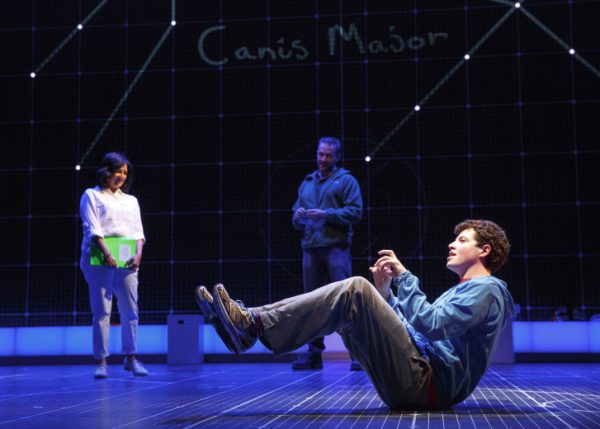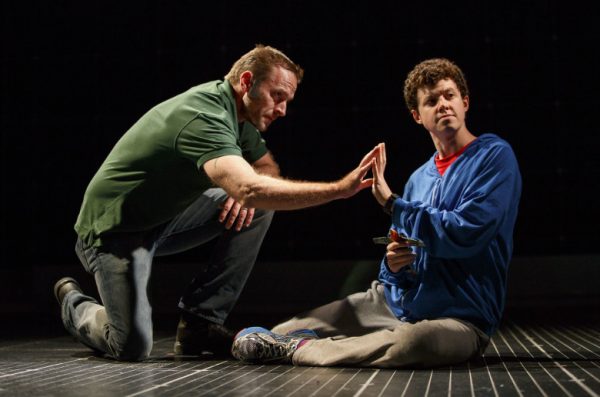The Curious Incident of the Dog in the Night-Time at The Ahmanson Theatre invites such an abundance of thoughts that it is hard to know where to begin. So the only thing to do is dive in.
It is an unusual whodunit based on the best-selling first-person novel by Mark Haddon and adapted for the stage by Simon Stephens. (Stephens is also the author of Heisenberg, an altogether different play that just closed at the Mark Taper Forum next door.) Set in England, Curious Incident is about the seemingly senseless murder of Wellington, a neighbor’s pet dog.
Wellington’s body, pierced by a pitchfork, is discovered by young Christopher Boone, age “15 years three months and two days” as he meticulously informs the policeman who posed the question after showing up to investigate. Something’s a little “off” with Christopher, whose behavior is so naïve and disarmingly literal that, combined with his presence at the scene of the crime, it makes him an immediate suspect.
Christopher assures the policeman that he did not kill the dog because he loved Wellington, and because he does not lie. Christopher, it turns out, also doesn’t cope well with chaos, has a very detailed form of total recall and a prodigious facility for “maths.” In short, he behaves like someone on the autism spectrum, although just where he lands on that spectrum is neither named nor addressed. One of his idiosyncrasies is that he cannot bear to be touched, which almost gets him arrested for assaulting an officer when the policeman tries to grab him.
[alert type=alert-white ]Please consider making a tax-deductible donation now so we can keep publishing strong creative voices.[/alert]
What makes a play out of this Incident is Christopher’s decision to find out who murdered Wellington, because once Christopher makes a decision, as we also find out, he does not give up. He also has determined to write a book about his personal investigation, an adventure that takes him — and us — on a merry chase and leads him to some unexpected discoveries and developments.
There is something spare and quick and even a few dead spots in the choppy circuitous way the play is written, but since it’s based on Christopher’s book, it is a reflection of the choppy, yet methodical way that his mind works. And since we know enough by now to know that the way his mind works is unique, we simply go along.
It is a journey filled with surprises, beautifully supported by the clockwork direction of Marianne Elliott (who also staged The National Theatre’s signal production of Angels In America and won a Tony for her staging of War Horse and of Curious Incident). Her vision is so stylized that it sometimes cedes to choreographed movement, with credit for that going to Steven Hoggett and Scott Graham.
Events play out on an empty rectangle of a stage designed by Bunny Christie (she also did the costumes) reminiscent of the stripped down arrangement for the Ivo van Hove View From the Bridge seen at The Ahmanson last fall. Many of the roles are anonymous, identified only as “voices,” which may be all they are to this young boy — voices — with some in the acting ensemble taking on several of the smaller roles and even standing in now and then, often humorously, for mechanical devices such as ticket dispensers and other machinery. For those with a long memory, it feels a little like a contemporary update of the theatre games and Story Theatre techniques popular in the 1970s and 80s.

The approach, intentional or not, reveals the spare interior of Christopher’s mind and his uniform perception of “others,” enhanced by Paule Constable’s intricate lighting and an extensive array of projected effects that illustrate this uncommon mind’s capacity for short circuiting and quick confusion.
Noteworthy above all are the spectacular videos of designer Finn Ross that inject a whole new level of sophisticated technological wizardry into the mix. Such an addition to theatrical production is a fairly recent phenomenon that can cut both ways, but that increasingly is coming into its own. When technology is gratuitously slapped on, it remains a distraction. But when it is justified by the unfolding drama and integrates seamlessly into the action, as it does here, it becomes art — an essential component of the total event, as enriching to the finished product as any other element.
For the actors (and the audience) this landscape is austere and vastly different from the blueprint of the old-fashioned kitchen-sink family drama. This is not August Osage County or Tennessee Williams. It is a new, expanding other kind of theatre, reflective of our changing times and technology’s ascension that can demand, if not fully command, our attention — yet.
It does come at a cost. There is an absence of deep emotional involvement for the actors as well as the audience. We admire the production’s novelty, but we do not wrap our arms around this more clinical approach. One of the enduring wonders of the practice of theatre is its malleability. It adapts in extraordinary ways to embrace change. The only prerequisite is for that change to be sufficiently compelling.

So we engage mostly cerebrally with Curious Incident and appreciate the disciplined commitment of the actors. The singular exception is Christopher, a role discharged by Adam Langdon with a level of dispassion that is on target, even as it takes some getting used to. (Note that Benjamin Wheelwright will be playing Christopher at all Saturday and Sunday matinees.)
If we cannot say as much for the other roles, that’s the trade off; it’s not easy to make a great impression as human machinery or a one-dimensional character, but it is possible to derive some comedy from it and these actors do — especially Amelia White who breathes life into Mrs. Alexander, a motherly neighbor who proffers affection upon Christopher, sharing cookies and gossip with him.
Gene Gillette turns in a disturbing image as Christopher’s nervous and tormented father Ed, and Felicity Jones Latta takes a healthy crack at Christopher’s wayward mother Judy. Together they manage, as the play progresses, to deliver some humanly touching moments. On the whole, however, all of this Incident’s characters serve at the pleasure of the totality of the production, which like a well-oiled machine, is quite a bit more than the sum of its parts.

Top image: The stage with members of the cast of The Curious Incident of the Dog in the Night-Time.
Photos by Joan Marcus.
WHAT: The Curious Incident of the Dog in the Night-Time.
WHERE: Ahmanson Theatre, The Music Center, 135 N. Grand Avenue in Downtown L.A. 90012.
WHEN: Tuesdays-Fridays, 8pm; Saturdays, 2 & 8 pm; Sundays, 1 & 6:30 p.m. Ends Sept. 10.
HOW: Tickets: $25–$130 (subject to change), available online at CenterTheatreGroup.org, or at (213) 972-4400, or in person at the Center Theatre Group Box Office. Groups: (213) 972-7231. Deaf community: Info & charge at CenterTheatreGroup.org/ACCESS.
